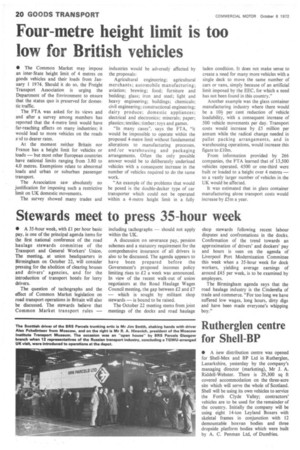Four-metre height limit is too low for British vehicles
Page 22

If you've noticed an error in this article please click here to report it so we can fix it.
• The Common Market may impose an inter-State height limit of 4 metres on goods vehicles and their loads from January 1 1974. Should it do so, the Freight Transport Association is urging the Department of the Environment to ensure that the status quo is preserved for domestic traffic.
The FTA was asked for its views and and after a survey among members has reported that the 4-metre limit would have far-reaching effects on many industries; it would lead to more vehicles on the roads a id to dearer rates.
At the moment neither Britain nor France has a height limit for vehicles or loads — but most other European countries have national limits ranging from 3.80 to 4.0 metres. Exemptions relate to abnormal loads and urban or suburban passenger transport.
The Association saw absolutely no justification for imposing such a restrictive limit on UK domestic movements.
The survey showed many trades and industries would be adversely affected by the proposals: Agricultural engineering; agricultural merchants; automobile manufacturing; aviation; brewing: food; furniture and bedding; glass; iron and steel; light and heavy engineering; buildings; chemicals; civil engineering; constructional engineering; dairy produce; domestic appliances; electrical and electronics; minerals; paper; plastics; textiles; timber; toys and games.
"In many cases". says the FTA, "it would be impossible to operate within the proposed 4-metre limit without fundamental alterations to manufacturing processes, and /or warehousing and packaging arrangements. Often the only possible answer would be to deliberately underload vehicles with a consequent increase in the number of vehicles required to do the same work.
"An example of the problems that would be posed is the double-decker type of car transporter which could not be operated within a 4-metre height limit in a fully laden condition. It does not make sense to create a need for many more vehicles with a single deck to move the same number of cars or vans, simply because of an artificial limit imposed by the EEC, for which a need has not been found in this country."
Another example was the glass container manufacturing industry where there would be a 10+ per cent reduction of vehicle loadability, with a consequent increase of 500 vehicle movements per day. Transport costs would increase by £5 million per annum while the radical change needed in pallet packing arrangements, and in warehousing operations, would increase this figure to £10m.
From information provided by 266 companies, the FTA learned that of 13,500 vehicles operated, 4500 or one-third were built or loaded to a height over 4 metres — so a vastly larger number of vehicles in the UK would be affected.
It was estimated that in glass container manufacturing alone transport costs would increase by £.5m a year.






































































































